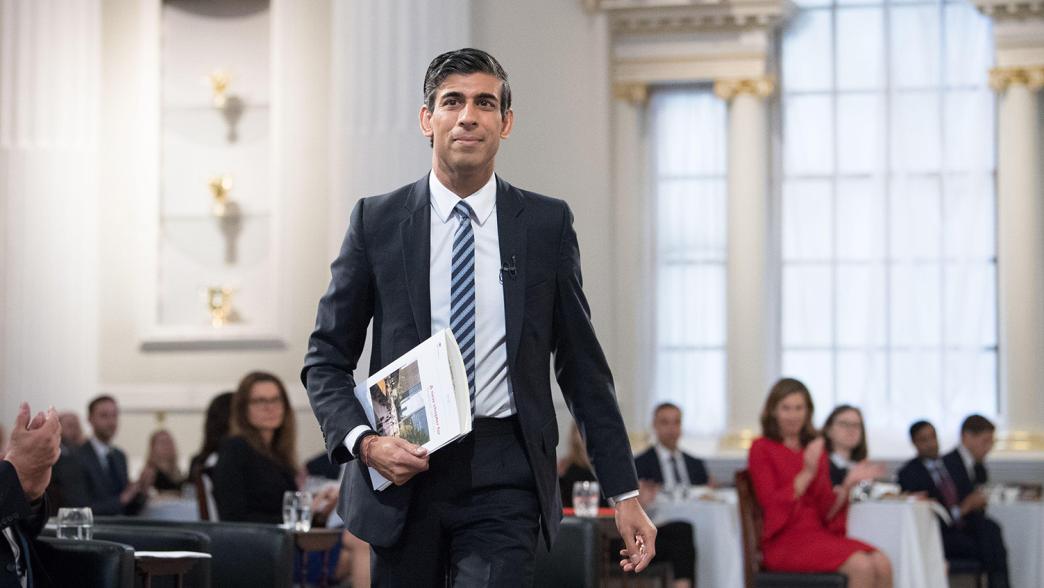Rishi Sunak turns to the City in search of Brexit dividends
The government's choices will determine whether embracing regulatory freedom will outweigh the disadvantages of losing access to the single market.

The chancellor has stopped looking to Brussels for the future of financial services, instead targeting changes to UK regulation to deliver a Brexit dividend, says Joe Marshall
It is not clear whether the chancellor jumped out of choice or was pushed by EU delays. But Sunak’s Mansion House speech indicated that the Treasury – for now at least – had given up waiting for the EU to grant substantial ‘equivalence’ decisions in financial services. Originally due a year ago, these would have allowed UK firms some access to EU financial markets on the condition that the UK’s regulatory regime provided ‘equivalent’ standards – potentially stymying the UK’s ability to make major changes to inherited EU rules.
Instead, Sunak confirmed that the UK would start charting its own course, a journey that may see it depart from the EU rules kept in place after Brexit. On this, as in other areas, the choices the government makes will determine whether embracing regulatory freedom will outweigh the disadvantages of losing access to the EU single market.
The chancellor has set out his vision for financial services after Brexit
The UK’s final departure from the EU, in December last year, has refocused attention on regulatory reform – and opened the door to change after years of political distraction. Sunak made much of the potential to use Brexit as an opportunity to revisit financial services regulation, repeating his commitment to implement at least parts of two recent government-commissioned reviews, on the UK’s companies listings regime and fintech. He has also promised reforms to drive the financial sector to support the government’s ‘green recovery’, such as the development of the world's first green savings bond and rules requiring firms to disclose their environmental impact.
The chancellor is clearly keen to help firms to trial technological innovations and scale up new products, seeking a ‘first mover’ advantage by acting quickly in this space. But in other areas, the UK is playing catch up. Plans to make the UK a more attractive place to list new companies are as much about matching the success of Amsterdam and New York than adopting a trail-blazing post-Brexit approach.
Some reforms are clearly an effort to tackle the EU financial regulations most vocally criticised by the City, such as Solvency II, which covers prudential regulation in the insurance sector and which many argue doesn’t do enough to take account of the specific needs of the UK insurance sector. The chancellor also emphasised a wish to pivot away from Europe and instead “push for closer co-operation and more cross-border access with other like-minded financial centres in markets around the world”, citing the US, Singapore and Switzerland.
Sunak’s ambitions are clear – but don’t expect Singapore on Thames
Sunak clearly sees financial services as a sector where the benefits of divergence are worth the risks. The UK-EU Trade and Cooperation Agreement does little for the sector, and with financial services outside the scope of the Northern Ireland protocol, divergence need not risk deepening the controversial Irish Sea border. As a reserved policy area (meaning the devolved governments have no options to ‘go their own way’) there is also reduced scope for any changes to affect the UK internal market.
The EU’s reluctance to grant equivalence only tips the scales in favour of divergence further. The UK is now in competition with the bloc, and has already seen a substantial slice of the City’s business move to Europe. The government will hope its regulatory reforms can give the UK an edge.
But this is unlikely to mean mass deregulation or the creation of ‘Singapore on Thames’, as some feared – and others promised – during the Brexit referendum campaign. The chancellor was clear to praise the UK’s high regulatory standards, while the governor of the Bank of England has talked of strengthening EU rules rather than lowering them – for example, by preventing banks counting software assets towards the reserves they must keep to weather economic shocks. However, proposals to regulate some investment firms in a more ‘proportionate’ manner, and to take a more permissive approach to off-exchange trading (trading done directly between parties, rather than with the supervision of an exchange), suggest that some regulatory requirements may be at least softened.
Sunak’s speech underlines the shift in Treasury thinking
Over the course of the Brexit process, the Treasury has been on a journey in financial services. Having initially sought a bespoke deal with the EU, its focus has gradually shifted towards making the most of its new-found freedoms to regulate differently. The chancellor’s speech confirmed this trajectory. Whether and how far this makes up for losing access to EU markets, however, will depend on how effectively (and quickly) Sunak can translate his rhetoric into real, beneficial regulatory change.
- Supporting document
- taking-back-control-regulation.pdf (PDF, 849.36 KB)
- Topic
- Brexit Regulation
- Department
- HM Treasury
- Public figures
- Rishi Sunak
- Publisher
- Institute for Government